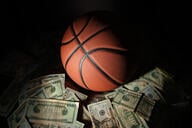You have /5 articles left.
Sign up for a free account or log in.

Alan Krueger
Princeton
The most valuable lessons I learned in college happened outside the classroom. That may be true for most of us, or it may be a sign that I failed to take advantage of the academic opportunities college presented.
Perhaps the most interesting of those lessons concerned the vagaries of the news cycle. In the spring of my sophomore year, a spontaneous student protest flared up in response to a speech by the college president defending the college’s restrictive dormitory visitation rules, rules that by today’s standards seem quaint and from another planet.
I somehow found myself as one of the leaders of the protest, although “leader” isn’t the right word. We discovered quickly that we had little control over events in a fluid, rapidly changing situation, and we worried that forces that were less idealistic and more radical might hijack the “movement.” I learned that night how energizing and motivating having a cause can be, and I discovered that there are women drawn to revolutionaries, even geeky ones.
As events were unfolding, we decided to call the local newspaper to see if it might be interested in covering the story. The news desk wasn’t particularly excited, telling us to call back if there was a riot or anything interesting.
Ten minutes later they called back and said that a reporter and photographer were on the way, and the next morning we were front-page news, the lead story. It turned out we had picked a night when nothing of consequence was happening anywhere else in the world, and as a result we were newsworthy.
Of course the converse can happen as well. An important story can be buried by attention given to another story. That happened a few weeks ago in the world of college admissions. The massive coverage of the Operation Varsity Blues scandal meant that a less sexy but more consequential story got ignored.
That story is the death of Princeton economist Alan Krueger. Krueger, a superstar in his field who had served as chair of the Council of Economic Advisors under President Obama, ended his own life on March 16 at the age of 58. His suicide sent shivers throughout academia not dissimilar to those felt in other fields following the suicide by Anthony Bourdain in June.
Krueger was less a theorist and more a data analyst than many other economists, and his genius was the use of data to study problems ranging from how raising the minimum wage impacts hiring in the fast food industry to whether poverty is a cause of terrorism to the rising price of concert tickets.
That’s where college admission comes in. Krueger was the author, along with Stacy Berg Dale, of an important 2002 article (updated in 2011) studying the seminal college admission question of the relationship between attending a highly selective college and future success.
That issue underlies so much that happens in the college admission world. Where does the value of a college education come from? Is it the name on the diploma or window decal, or is it the college experience itself, no matter where one goes? Should one choose a college based on prestige or based on fit?
I would describe prestige versus fit as a clash of worldviews, to borrow a term from philosophy. Where you fall on that question is partly a matter of fact and partly a matter of faith.
The prestige worldview drives the obsession with selectivity on the college side, hoping that all of us will believe that the harder a place is to get in to, the better it must be. Without the suburban legend that prestige equals quality, there would be no U.S. News college rankings. And some of the behavior that led to the Operation Varsity Blues scandal was at least partly grounded in a belief among parents that going to an “elite” college justifies criminal activity, although the motivation seems less about the educational needs of the children and more about the status needs of the parents.
Krueger and Dale’s contribution to the prestige/fit debate was a study focused on a cohort of individuals who had been admitted to an elite, selective college but had enrolled in a less selective school. Like previous studies, it used earnings as a metric for success, and we might certainly question that. Whereas previous studies had shown a clear earnings advantage arising from attending a more selective college, Krueger and Dale showed that what led to success was not attending the selective college as much as having the academic and personal qualities to be admitted to a selective college. Those who were admitted but chose to attend a less selective institution had comparable earnings to those attending elite colleges. To borrow liberally from Shakespeare, the benefits lie not in our star colleges, but in ourselves.
The Krueger-Dale study has certainly been challenged by economists such as Caroline Hoxby, but the 2011 update of the original research reinforced the original results. I wonder if that will continue to be the case. The Krueger-Dale research was conducted using the College and Beyond data set and the National Longitudinal Study of those who graduated from high school in 1972. The nature of the student bodies at selective colleges and the degree of selectivity has changed dramatically since that time. Many students who 20 years ago would have been admitted to multiple highly selective colleges without question can’t sniff a spot in today’s hyperselective admissions landscape. Will those changes weaken or strengthen the Krueger-Dale conclusions?
Regardless of what the future holds, Alan Krueger made an important contribution to the college admissions world just as he did in other areas, and we should take a moment to recognize and appreciate his work. The Operation Varsity Blues parents would have been much better served by consulting with Alan Krueger than William Singer.




